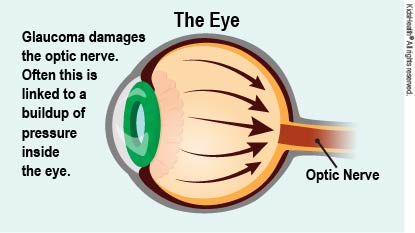- Parents Home
- Para Padres
- A to Z Dictionary
- Allergy Center
- Asthma
- Cancer
- Diabetes
- Diseases & Conditions
- Doctors & Hospitals
- Emotions & Behavior
- First Aid & Safety
- Flu (Influenza)
- Food Allergies
- General Health
- Growth & Development
- Heart Health & Conditions
- Homework Help Center
- Infections
- Newborn Care
- Nutrition & Fitness
- Play & Learn
- Pregnancy Center
- Preventing Premature Birth
- Q&A
- School & Family Life
- Sports Medicine
- Teens Home
- Para Adolescentes
- Asthma
- Be Your Best Self
- Body & Skin Care
- Cancer
- Diabetes
- Diseases & Conditions
- Drugs & Alcohol
- Flu (Influenza)
- Homework Help
- Infections
- Managing Your Weight
- Medical Care 101
- Mental Health
- Nutrition & Fitness
- Q&A
- Safety & First Aid
- School, Jobs, & Friends
- Sexual Health
- Sports Medicine
- Stress & Coping
Glaucoma
What Is Glaucoma?
Glaucoma is a condition that damages the eye's optic nerve. It gets worse over time and leads to vision loss if not treated. The damage from glaucoma often is linked to a buildup of pressure inside the eye.
Regular eye exams can help doctors find glaucoma (glau-KOH-muh) early and start treatment right away.
What Happens in Glaucoma?
Normally, a healthy eye makes clear fluid that slowly drains from the eye.
In a person with glaucoma, the eye usually either makes too much fluid too fast or the fluid drains away too slowly. This typically causes the pressure in the eye to increase, which can lead to optic nerve damage and vision problems.
What Problems Can Happen?
Glaucoma can make it hard for a person to see or may even cause total blindness. That's because the optic nerve is the main nerve that carries signals from the eye to the brain, allowing us to see.
If a person loses their vision due to glaucoma, their vision doesn't come back, even if the eye pressure goes back to normal.
When kids have glaucoma, vision loss usually happens more quickly and is often more severe than when adults have glaucoma.
What Are the Signs & Symptoms of Glaucoma?
Doctors may notice symptoms at birth. But glaucoma doesn't always show up right away. Children can develop it as they grow.

In babies, doctors might notice eye shape or size issues that are clues a child might have glaucoma. Babies with glaucoma may have:
- large eyes
- a dull or cloudy eye
- tears when not crying
- redness in the sclera (the white part of the eye)
- sensitivity to light
- a lot of blinking
Older children and teens may have:
- blurry vision
- nearsightedness that gets worse
- trouble seeing things off to the side
- headaches
A child also can have glaucoma with no symptoms. That's why it's important for kids to have regular eye exams as they grow up.
What Causes Glaucoma?
The cause of glaucoma can vary from child to child. Sometimes a child inherits it from a parent. Other times, doctors don't know the cause.
Other causes include:
- a change (mutation) in a child's DNA
- a medical condition, disease, or eye injury
- eye surgery or other surgery
- medicine (like a steroid)
How Is Glaucoma Diagnosed?
A pediatric eye specialist (ophthalmologist or optometrist) will do a glaucoma test and a full eye exam. They check the pressure in the eyes and look inside the eyes for any damage to the optic nerve. Sometimes doctors get an optical coherence tomography (OCT) test to look for early damage to the optic nerve.
In older kids, the doctor will check the child's eyesight and how well they can see above, below, and to the sides when looking straight ahead (visual fields).
How Is Glaucoma Treated?
An eye surgeon (pediatric ophthalmologist) usually treats children who have glaucoma. Depending on the child's age, the cause of the glaucoma, and other things, treatment may include:
- making changes to medicines taken for another problem
- eye drops or medicines taken by mouth
- surgery, including laser treatments
Surgery is usually the best treatment for babies or young kids. The goal is to fix the eye so that more fluid drains out or it makes less fluid.
After treatment, the eye doctor will check the pressure and do other tests regularly to make sure the glaucoma does not return. Some kids may need more than one treatment to keep the pressure down and prevent worse damage.
How Can Parents Help?
Eye pressure can change during puberty and at other times in a person's life. So kids and teens should get their eyes checked during childhood and throughout adulthood.
If your child has glaucoma, here's how you can help:
- Take your child to all follow-up doctor visits.
- Give your child eye drops or medicines as prescribed.
- Ask your child's care team about support groups and other resources in your community. For example, assistive tools and low-vision services can help kids with vision loss.

© 1995- The Nemours Foundation. KidsHealth® is a registered trademark of The Nemours Foundation. All rights reserved.
Images sourced by The Nemours Foundation and Getty Images.